 |
I was talking to the head of the fixed income desk of a major investment bank in London the day last week when agency debt spreads increased more than 90 basis points over US Treasuries. Agency bonds, namely mortgage bonds from GSEs, have an implicit US government guarantee so they usually trade close to treasuries with little spread.
Then all of a sudden they didn’t. The reason? Leverage – and lots of it. In fact, my friend told me, there is by his estimate $6 trillion in excessive leverage built up over the past ten years that has to be unwound. So the credit crisis that started June 2007 with obscure financially engineered debt products such as CDOs has not evolved to include bonds presumably backed by the US government. Guess what’s next after Agency debt? You guessed it!
Our road to the American Bond Crisis starts with another note from my pal Rick Ackerman today. He recently published Inflation's Last Gasp and attributes a number of comments on inflation to me.
As Ronald Reagan would say, “There he goes again!”
The first challenge of an argument with Rick is that he tends to invent a position for me then take the other side. If Rick and I were arguing about how to treat an illness versus the economy and I said, “Take an aspirin” he’d say in his rebuttal, “Eric says we should eat carrots when in fact we all know perfectly well that we should use leaches.” For example, “Eric and the inflationists implicitly believe not only that those fat raises for airline employees and autoworkers are coming, but that our homes are about to increase in value dramatically.”
Why say that I imply something when you can instead simply restate what I actually say? I’ve been warning of an eventual major correction in real estate since August 2002 and finally called a top in June 2005 after describing the crash process in Jan. 2005 that pretty much lays out what’s happened. More recently I said I expect a 38% correction nationally before the whole sorry episode is over. Well, 38% at least in real terms. Perhaps in nominal terms prices won’t fall so much.
Because we’re going to get so much inflation.
And here he goes again.
"Eric argues that commodity price-inflation is a leading indicator of wage inflation, and that wages are therefore all but ordained to play catch-up."
No, I say the Fed says that. I say wage inflation will certainly get inflation rising faster, but it is not politically expedient, in terms of economic policy, to do so. Which is not to say there is no wage inflation but you have to know where to look. In our not-so-fair, not-so-free-market system if you are in the top 99th percentile of wage earners your wages were up 7.6% between 2004 and 2005 and if you were among the tippy top 0.5% why your wages were up a very healthy 16% over that one year period. 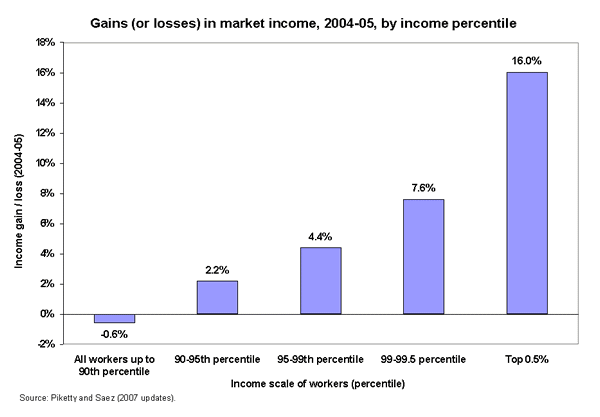
But I doubt six or seven hundred thousand high paid folks are driving the inflation we've seen since 2004. But then what is? Why has wage inflation been unnecessary to create the present high rate of inflation? We’ve got $108 oil, $3.25 gas, groceries and food prices rising since 2004 and all the while nominal wages, except for the folks at the top as noted, have been flat and in fact falling in real terms, that is, adjusted for the inflation that you and others have said for years wouldn't happen.

Inflation adjustment of wages is necessary on account there has been so much inflation as shown here in commodity prices.
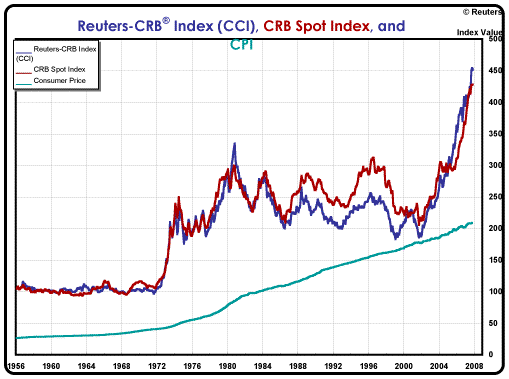
If the US economy didn’t need wage inflation to get all that price inflation we've experienced since 2004, why will we need wage inflation to have more in the future? Where is the logic in that?
The reason we have all of this inflation is because the dollar has been declining. Had it declined more we’d have even more inflation. Going forward, all that has to happen for inflation to continue to rise is for the dollar to continue to fall as it has and for energy and other import prices to increase as they have.
So forget wage inflation. The only inflation input that is necessary to keep building inflation expectations in the US economy is the rising price of everything priced in dollars, even as the recession deepens.
But wait, you say. In a recession demand falls and goods prices with it. Well, that was true back when producers weren’t good at anticipating a fall in demand and cutting back on production ahead of it. Welcome to the 2000s and computers and the Internet. In the 1930s producers didn’t have the tools or data to cut production ahead of falling demand. Now they do, and they will, and they have.
For example, since 2004 oil demand has been falling everywhere except where it is subsidized by government – China, India, oil producing countries – as prices rose 400% in dollars. But what happens to poor J6P if jobs are scarce and inflation is eating up his meager savings and he's out of new sources of credit all at the same time?
As I've said, this is not your average business cycle recession.
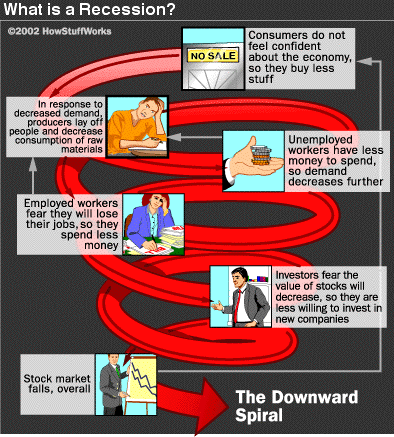 ........
........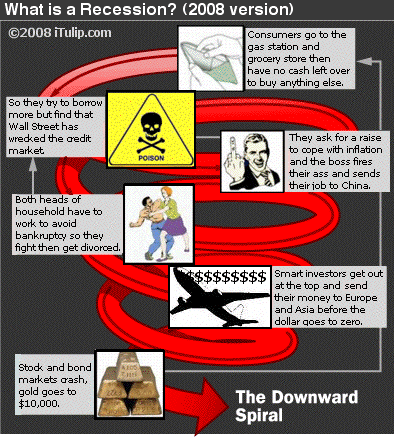
Okay, so we have all of this cost-push inflation from dollar priced imports, except the made-in-China stuff is still cheap, until it isn't either – that comes later as China allows the yuan to rise the way our genius Congress says it should.
Debt defaults are rising. Credit is tightening. Unemployment is rising. It’s getting ugly out there.
How about we throw a US Treasury bond crisis into the mix?
I was talking to the head of the fixed income desk of a major investment bank in London the day last week when agency debt spreads increased more than 90 basis points over treasuries. Agency debt has an implicit US government guarantee so they usually trade close to treasuries with little spread. Then all of a sudden they didn’t. The problem? Leverage. In fact, my friend told me, there is $6 trillion in leverage that has to be unwound.
Fed Needs to Buy Agency Mortgage Bonds, Pimco
March 10, 2008 (Bloomberg)
The Federal Reserve or another part of the U.S. government should start buying so-called agency mortgage-backed securities to stabilize the market, a Pacific Investment Management Co. executive said.
Concern that Freddie Mac and Fannie Mae, which plunged to the lowest since 1995 in New York Stock Exchange trading today, may fail have contributed to the rising spreads, David Land, a mortgage-bond portfolio manager at Advantus Capital Management in St. Paul, Minnesota, said in a telephone interview today.
No surprise to us. Years ago in Ka-Poom Theory is a Rhyme not a Repeat of History we could see that the Fed was likely to wind up buying mortgage paper. So guess what’s next? You guessed it!March 10, 2008 (Bloomberg)
The Federal Reserve or another part of the U.S. government should start buying so-called agency mortgage-backed securities to stabilize the market, a Pacific Investment Management Co. executive said.
Concern that Freddie Mac and Fannie Mae, which plunged to the lowest since 1995 in New York Stock Exchange trading today, may fail have contributed to the rising spreads, David Land, a mortgage-bond portfolio manager at Advantus Capital Management in St. Paul, Minnesota, said in a telephone interview today.
Hedge funds reel from margin calls even on Treasuries
March 11, 2008 (TheStar)
LONDON: The hedge-fund industry is reeling from its worst crisis in a decade as banks are now demanding more money pledged to support outstanding loans even when the investment is backed by the full faith and credit of the United States.
What happens to inflation in an American Bond Crisis? Why hypothesize when there are recent real world examples to learn from?March 11, 2008 (TheStar)
LONDON: The hedge-fund industry is reeling from its worst crisis in a decade as banks are now demanding more money pledged to support outstanding loans even when the investment is backed by the full faith and credit of the United States.
Let’s take a look at what happened to Russia during their bond crisis in 1998. See money growth and inflation declining steadily from 1995 to 1998? Then... whammo! The Russian Bond Crisis hit.
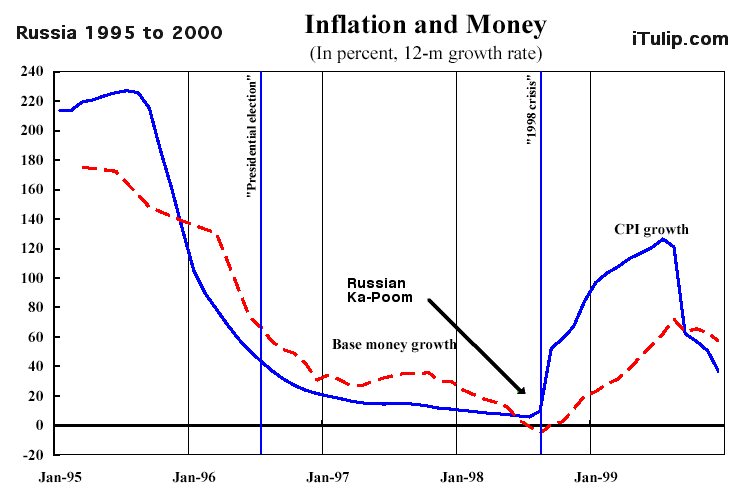
Russian money growth and inflation 1995 to 2000
The year it hit in 1998 GDP growth was –4.9%, a serious recession. Must have had price deflation after that, right?
Nope. That year inflation averaged 84.4%.
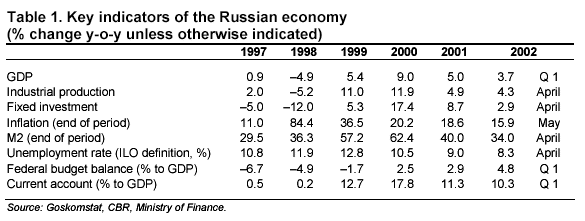
Can that happen in the USA? Not to the extent of the Russian Bond Crisis because the Russians had way too much short term debt owed in foreign currencies. US foreign debts are largely long term and owed in US currency. A uniquely American version of the process is occurring.
But why am I arguing with you using examples? You tell me, "As you will have long since surmised, I prefer to argue the case for deflation more from instinct than in accordance with economic theory."
This is just the real world, not the colorful make-believe world based on imagination and intuition where leaches work as well as aspirin. In the real world the currencies of defaulting countries do not appreciate, they depreciate. Show me a country with a depreciating currency and all-goods price deflation and I will gladly slap on a leach or two next time I'm ill.
As the credit crisis continues to evolve, the dollar plumbs new lows, dollar priced commodities such as oil and precious metals rise, and inflation pressures intensify, I hope that we can soon put to rest worries about an appreciating dollar and price deflation. Deflation was the last crisis, in 2001 and 2002, but is not this crisis. I also hope that we have in the process of arguing this point finally come up with a name to replace the incorrect label "subprime crisis" that the mainstream press carelessly slapped on the box filled with stories about the symptoms of the process we laid out in Risk Pollution and the Housing Bubble and elsewhere on iTulip over the years.
This will go down in history as The American Bond Crisis.
See also:
The deflation case: caught, gutted, poached and eaten
Door Number Two: moderate inflation vs hyperinflation vs deflation
iTulip Select: The Investment Thesis for the Next Cycle™
__________________________________________________
To receive the iTulip Newsletter or iTulip Alerts, Join our FREE Email Mailing List
Copyright © iTulip, Inc. 1998 - 2007 All Rights Reserved
All information provided "as is" for informational purposes only, not intended for trading purposes or advice. Nothing appearing on this website should be considered a recommendation to buy or to sell any security or related financial instrument. iTulip, Inc. is not liable for any informational errors, incompleteness, or delays, or for any actions taken in reliance on information contained herein. Full Disclaimer
Comment